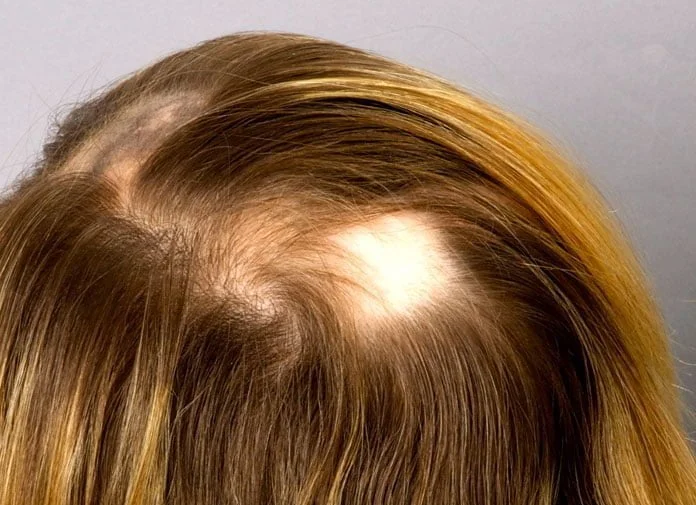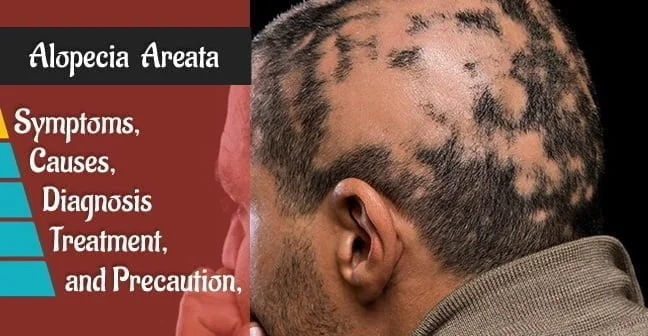Alopecia Areata, also known as spot baldness, is a condition in which hair is lost from some or all areas of the body. Alopecia Areata is a type of hair loss that occurs when your immune system mistakenly attacks the hair follicle. People are generally otherwise healthy. In a few, all the hair on the scalp or all body hair is lost and loss can be permanent.

Risk factors include a family history of the condition. Among identical twins, if one is affected the other has about a 50% chance of also being affected.
Signs and symptoms
The main symptom of alopecia areata is hair loss. Hair usually falls out in small round patches on the scalp. These patches are usually several centimeters or less. Hair loss might also occur in other parts of the body. You may first notice clumps of hair on your pillow or in the shower. However, other types of Hair diseases can also cause hair to fall out in a similar pattern. Hair loss alone shouldn’t be used to diagnose alopecia areata.
In rare cases, some people may experience more extensive hair loss. This is usually an indication of another type of alopecia, such as:
- alopecia totalis, which is the loss of all hair on the scalp
- alopecia Universalis, which is the loss of all hair on the entire body
Major Causes of Alopecia Areata
Alopecia areata is an autoimmune disease. An autoimmune disease develops when the immune system mistakes healthy cells for foreign substances. Normally, the immune system defends your body against foreign invaders, such as viruses and bacteria. If you have alopecia areata, however, your immune system mistakenly attacks your hair follicles. Hair follicles are the structures from which hairs grow. The follicles become smaller and stop producing hair, leading to hair loss. The autoimmune disorder is one of the main causes of Alopecia Areata.
One in five people with alopecia areata also has a family member who has experienced the condition.
Stress also comes in one of the causes of alopecia areata.
How is Alopecia Areata diagnosed?
Your doctor will review your symptoms to determine if you have alopecia areata. They may be able to diagnose alopecia areata simply by looking at the extent of your hair loss. Blood tests might be done if other autoimmune conditions are suspected. The specific blood test performed depends on the particular disorder your doctor suspects.
How dangerous is Alopecia Areata
It’s not life-threatening but the presence of Alopecia Areata is a sign that there are other problems going on in the body that need to be addressed. Vitamin D has a well-established effect on the immune system and is linked to a variety of other autoimmune diseases.
Treatment of Alopecia Areata
The most common form of alopecia areata treatment is the use of corticosteroids, powerful anti-inflammatory drugs that can suppress the immune system. These are most commonly administered through local injections, topical ointment application, or orally.

Other medications that can be prescribed that either promote hair growth or affect the immune system include Minoxidil, Anthralin, SADBE, and DPCP. Although some of these may help with the re-growth of hair, they cannot prevent the formation of new bald patches.
Some basic Precautions:
- Wear sunscreen if exposed to the sun.
- Wear wraparound glasses to protect the eyes from the sun and debris which the eyebrows and eyelashes would normally defend against.
- Use headwear such as hats, wigs, and scarves to protect the head from the sun or keep it warm.
Alopecia areata does not directly make people sick, nor is it contagious. It can, however, be difficult to adapt to emotionally. For many people, alopecia areata is a traumatic disease that warrants treatment addressing the emotional aspect of hair loss, as well as the hair loss itself.
Ask for a consultation to get a better idea of the cost of your particular case.
For an appointment from Jaipur Skincity, call us at 9468975757. Dr. Sachin Sharda is a highly experienced Dermatologist in Jaipur who provides the best hair-related treatments, like low-level laser therapy, laser hair removal, and hair transplant in Jaipur. You can access reasonably priced laser hair removal and hair transplant cost in Jaipur through his services.
FAQ’s
Q.1 Is alopecia areata permanent?
Ans. Because alopecia areata cannot be cured, people who have regrowth can have more hair loss later. Some people have cycles of hair loss and regrowth. If your hair doesn’t regrow on its own, medical treatments may help. There are many treatments for alopecia areata, and scientists are studying new possibilities.
Q.2 Can your hair grow back if you have alopecia?
Ans. Alopecia areata causes hair loss, usually on the head and face. The disease is different for each person – some people’s hair grows back fully, while it does not in others. There is no cure for alopecia areata, but there are treatments that help hair grow back more quickly.
Q.3 Can you stop alopecia?
Ans. There’s currently no cure for alopecia areata. However, there are treatments that may help hair grow back more quickly and that can prevent future hair loss, as well as unique ways to cover up hair loss. Resources are also available to help people cope with stress related to hair loss.



